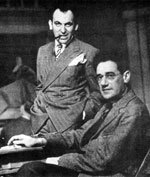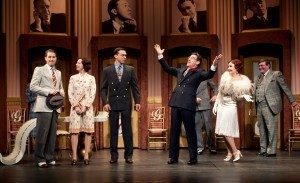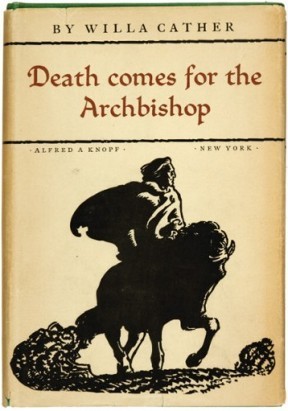Terry Teachout's Blog, page 180
February 10, 2012
TT: All talking! All laughing!
* * *
 If you're a theater buff with a serious interest in American comedy, "Once in a Lifetime" probably ranks high on the list of little-known shows you'd love to see onstage. Otherwise, I doubt you've heard of it. A farce about the coming of talking pictures to Hollywood, "Once in a Lifetime" was the first collaboration between George S. Kaufman and Moss Hart, who went on to write "The Man Who Came to Dinner" and "You Can't Take It With You." It opened on Broadway in 1930 and ran for 406 performances, which was big business back then. Two years later, it was turned into a middling movie, then vanished from sight (the 1979 Broadway revival was a flop). Today the play is known solely because Mr. Hart wrote about how it came to Broadway in "Act One," his 1959 autobiography.
If you're a theater buff with a serious interest in American comedy, "Once in a Lifetime" probably ranks high on the list of little-known shows you'd love to see onstage. Otherwise, I doubt you've heard of it. A farce about the coming of talking pictures to Hollywood, "Once in a Lifetime" was the first collaboration between George S. Kaufman and Moss Hart, who went on to write "The Man Who Came to Dinner" and "You Can't Take It With You." It opened on Broadway in 1930 and ran for 406 performances, which was big business back then. Two years later, it was turned into a middling movie, then vanished from sight (the 1979 Broadway revival was a flop). Today the play is known solely because Mr. Hart wrote about how it came to Broadway in "Act One," his 1959 autobiography.Why doesn't anybody do "Once in a Lifetime" nowadays? It costs too much--way too much. The published script calls for five sets and 38 actors. You could get away with that in the Thirties, but no commercial producer would think of bringing so horrendously expensive a play to Broadway anymore. Enter San Francisco's American Conservatory Theater and Sarasota's Asolo Repertory Theatre, two regional companies that double as drama schools, making it possible for them to put on large-cast shows by using students to cover smaller parts. A.C.T. mounted "Once in a Lifetime" last fall and Asolo Rep is doing it now, and both versions, not coincidentally, were directed by the same man, Mark Rucker.
Since the two productions are identical in concept--most of the members of the cast play double, triple and quadruple roles--I tossed a coin and elected to see "Once in a Lifetime" at Asolo Rep, whose version makes use of 19 actors, four more than at A.C.T. It was worth the trip. "Once in a Lifetime" proves to be as fresh as any of the later screwball comedies on whose screenplays it surely left a mark (not to mention "Singin' in the Rain," whose authors, Betty Comden and Adolph Green, must have had it in mind).
 "Once in a Lifetime" is the story of George, Jerry and May (Jason Bradley, Andrew Carter and Hillary Clemens), a trio of small-time vaudeville hoofers who see the premiere of "The Jazz Singer" in New York and decide to go to Hollywood, pass themselves off as authorities on elocution and make their fortune by teaching silent-movie actors how to talk....
"Once in a Lifetime" is the story of George, Jerry and May (Jason Bradley, Andrew Carter and Hillary Clemens), a trio of small-time vaudeville hoofers who see the premiere of "The Jazz Singer" in New York and decide to go to Hollywood, pass themselves off as authorities on elocution and make their fortune by teaching silent-movie actors how to talk....This premise is so familiar that you have to remind yourself that Kaufman and Hart were the first writers ever to turn it into a plot. Part of what makes "Once in a Lifetime" more than just a historical curiosity is the jaundiced wit with which the characters comment on the head-banging craziness that surrounds them. (Jerry, working a crossword puzzle: "What's a four-letter word for actor?" May: "Dope.") But mere wisecracks won't make a play fly. That's where craftsmanship comes in, and the authors of "Once in a Lifetime" knew their stuff. Every piece of the puzzle fits together with a crisp, satisfying click...
Ms. Clemens, who gave a poignant performance as the tomboy in Writers' Theatre's 2008 Chicago revival of "Picnic," plays May as a spunky, cloche-hatted girl-next-door who knows how to snap off a punch line, which is just right....
* * *
Read the whole thing here .
The 1932 film adaptation of Once in a Lifetime:
Aline MacMahon, who plays May, created the role in the original Brighton Beach tryout of the stage version, but was replaced on Broadway by Jean Dixon. She later appeared in the play's Los Angeles premiere.
TT: Almanac
Alec Wilkinson, A Violent Act
February 9, 2012
TT: All-American
Note that I didn't say best or greatest or significant or anything so highfalutin. This is a purely personal inventory, reflective only of admiration, love, and--if a reader who has no gift whatsoever for the writing of prose fiction can use the word--identification. These books speak to me, and if I could write a novel, they collectively represent the kind of novel I'd like to write:
 • Willa Cather, Death Comes for the Archbishop
• Willa Cather, Death Comes for the Archbishop• James Gould Cozzens, Guard of Honor
• F. Scott Fitzgerald, The Great Gatsby
• John P. Marquand, Point of No Return
• William Maxwell, So Long, See You Tomorrow
• Edwin O'Connor, The Edge of Sadness
• Walker Percy, The Moviegoer
• Dawn Powell, The Locusts Have No King
• Robert Penn Warren, All the King's Men
• Thornton Wilder, The Bridge of San Luis Rey
TT: So you want to see a show?
Here's my list of recommended Broadway, off-Broadway, and out-of-town shows, updated weekly. In all cases, I gave these shows favorable reviews (if sometimes qualifiedly so) in The Wall Street Journal when they opened. For more information, click on the title.
BROADWAY:
• Anything Goes (musical, G/PG-13, mildly adult subject matter that will be unintelligible to children, closes Sept. 9, most performances sold out last week, reviewed here)
• Godspell (musical, G, suitable for children, reviewed here)
• How to Succeed in Business Without Really Trying (musical, G/PG-13, perfectly fine for children whose parents aren't actively prudish, reviewed here)
• Other Desert Cities (drama, PG-13, adult subject matter, most performances sold out last week, extended through June 17, reviewed here)
• Seminar (serious comedy, PG-13, closes Mar. 4, reviewed here)
• Stick Fly (serious comedy, PG-13, reviewed here)
• Venus in Fur (serious comedy, R, adult subject matter, closes June 17, reviewed here)
OFF BROADWAY:
• The Agony and the Ecstasy of Steve Jobs (monologue, PG-13, closes Mar. 4, reviewed here)
• Avenue Q (musical, R, adult subject matter and one show-stopping scene of puppet-on-puppet sex, reviewed here)
• The Fantasticks (musical, G, suitable for children capable of enjoying a love story, reviewed here)
• Look Back in Anger (drama, PG-13, closes Apr. 8, reviewed here)
• Million Dollar Quartet (jukebox musical, G, off-Broadway remounting of Broadway production, original run reviewed here)
CLOSING SUNDAY IN SAN DIEGO:
• Dividing the Estate (drama, PG-13, remounting of Broadway production, adult subject matter, original run reviewed here)
CLOSING SUNDAY IN SANTA MONICA:
• Our Town (drama, G, remounting of off-Broadway production, suitable for mature children, original run reviewed here)
TT: Almanac
L.P. Hartley, Eustace and Hilda
February 8, 2012
TT: Reveille
 On Monday Mrs. T and I decided to take the long way from Sarasota to Winter Park. Shunning the interstate highways, we drove down two-lane roads that passed by countless orange groves and through tiny towns with names like Ona, Zolfo Springs, Avon Park, and--my favorite--Frostproof. Even the landmarks along the way bore picturesque names (first Troublesome Creek, then Peace River). Alas, we were only passing through, for I would have liked to spend a night at the
Hotel Jacaranda
, whose website recalls the long-ago days when Clark Gable and Babe Ruth graced its spacious rooms. But we had to return to Winter Park in time to meet a dinner guest, so we kept on driving.
On Monday Mrs. T and I decided to take the long way from Sarasota to Winter Park. Shunning the interstate highways, we drove down two-lane roads that passed by countless orange groves and through tiny towns with names like Ona, Zolfo Springs, Avon Park, and--my favorite--Frostproof. Even the landmarks along the way bore picturesque names (first Troublesome Creek, then Peace River). Alas, we were only passing through, for I would have liked to spend a night at the
Hotel Jacaranda
, whose website recalls the long-ago days when Clark Gable and Babe Ruth graced its spacious rooms. But we had to return to Winter Park in time to meet a dinner guest, so we kept on driving.As Mrs. T napped, I turned on the car radio and listened to Ravel's G Major Piano Concerto, whose brisk, jazz-flavored outer movements flank a seraphically tranquil evocation of the Larghetto of Mozart's Clarinet Quintet. It flows with such seemingly uncomplicated grace that one marvels at Ravel's confession that he found it all but impossible to write. "Flows so easily! Flows so easily!" he sputtered to a colleague who praised its apparent effortlessness. "I put it together bar by bar and I nearly died over it." Midway through the movement, Mrs. T awoke, looked out the window at the orange trees, and said, "They look like treasure." Then she fell asleep again.
I can never hear the slow movement of the Ravel Concerto in G without feeling that I'm being offered a momentary glimpse of a world beyond that which we see around us, one that is simple and serene and devoid of pain or sorrow or doubt. The glimpse comes toward the end of the movement, when the music modulates without warning into a new key. It sounds like a shaft of sunlight breaking through a slate-gray sky. My eyes always fill with tears when I hear that passage, and they did so yet again on Monday, right on cue.
What gives music such inexplicable power? I've spent the whole of my life immersed in that mysterious art, yet I haven't a clue as to what it is that makes me weep when I hear such things. All I know is that no other art makes me more intensely aware of life's cruel brevity, or of the brief moments of piercing beauty that make such knowledge supportable.
 Samuel Beckett said it: "We have time to grow old. The air is full of our cries. But habit is a great deadener. At me too someone is looking, of me too someone is saying, He is sleeping, he knows nothing, let him sleep on." To drive past an orange grove while listening to the Adagio assai of the Concerto in G is to be awakened, if only for a moment or two, to the beauty at the heart of things, to be fully alive for as long as we have it in us. Sooner or later habit will always lull us back into the terrible sleep of everyday life--but then a great work of art sounds reveille, and we sit bolt upright, see treasure, and weep.
Samuel Beckett said it: "We have time to grow old. The air is full of our cries. But habit is a great deadener. At me too someone is looking, of me too someone is saying, He is sleeping, he knows nothing, let him sleep on." To drive past an orange grove while listening to the Adagio assai of the Concerto in G is to be awakened, if only for a moment or two, to the beauty at the heart of things, to be fully alive for as long as we have it in us. Sooner or later habit will always lull us back into the terrible sleep of everyday life--but then a great work of art sounds reveille, and we sit bolt upright, see treasure, and weep.* * *
Martha Argerich plays the slow movement of Maurice Ravel's Concerto in G:
TT: Snapshot
(This is the latest in a series of arts-related videos that appear in this space each Monday and Wednesday.)
TT: Almanac
L.P. Hartley, Eustace and Hilda
February 7, 2012
TT: The case of the mysterious ashtray
Do you know anyone in your travels who might be able to identify this ashtray? The red- and blue-tipped sticks are matches. They're on a solid roll that spins inside the disc. The words inscribed inside the ribbon underneat the unicorn are SEMPER EADEM.
Drop me a line if you can shed any light:

TT: Almanac
Jonathan Swift, "Thoughts on Various Subjects, Moral and Diverting"
Terry Teachout's Blog
- Terry Teachout's profile
- 45 followers



